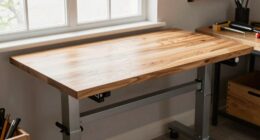To select the appropriate air compressor, consider how you’ll use it—lighter tasks need smaller, portable models, while heavy-duty jobs require larger, stationary units. Match the power source to your environment, like electric for indoor use and gas for outdoor sites. Check the airflow (CFM) and pressure (PSI) to ensure it meets your tools’ needs without wasting energy. Looking at efficiency features and portability can save you time and money; keep exploring to find the best fit for your tasks.
Key Takeaways
- Determine your workload to select between light-duty or heavy-duty compressors suitable for your tasks.
- Choose the appropriate power source (electric or gas) based on your work environment and mobility needs.
- Match the compressor’s CFM and PSI ratings to your tools’ requirements for optimal performance.
- Consider energy efficiency features like variable speed drives and cooling systems to reduce operational costs.
- Prioritize maintenance, noise levels, and portability to ensure the compressor fits your workspace and usage habits.

Are you unsure how to pick the right air compressor for your needs? Choosing the best model involves more than just looking at size or price; it requires understanding how different features impact your work, especially concerning compressor maintenance and energy efficiency. To start, consider what you’ll use the compressor for. Will you need it for light tasks like inflating tires or for heavy-duty applications such as powering pneumatic tools? The answer will guide you toward the right type, whether a portable unit or a larger, stationary compressor.
Next, pay attention to the compressor’s power source. Electric compressors are common for indoor, smaller jobs, offering quiet operation and lower maintenance needs. Gas-powered models, on the other hand, are better suited for outdoor or remote locations where electricity isn’t available. The key is to match the power source with your typical work environment, ensuring consistent performance.
Choose electric compressors for indoor use; gas-powered models excel outdoors or remote locations.
When evaluating different models, consider the compressor’s capacity—specifically, the airflow rate measured in cubic feet per minute (CFM) and the pressure in pounds per square inch (PSI). These specs determine whether the compressor can handle your tools or tasks efficiently. Overestimating capacity might lead to unnecessary energy consumption, while underestimating can cause performance issues. Striking a balance is essential for *effective* operation.
Energy efficiency is another *crucial* factor. A compressor with a high energy efficiency rating can save you money over time by reducing power consumption. Look for models with features like variable speed drives, which adjust the motor’s speed to match your workload, minimizing energy waste. Additionally, consider compressors with well-designed cooling systems and effective insulation, as these contribute to lower energy use and better performance.
Regular maintenance is *key* to ensuring your compressor operates smoothly and extends its lifespan. Implementing effective preventative measures, such as routine inspections and timely part replacements, can significantly reduce downtime and repair costs. Maintaining your compressor not only keeps it running efficiently but also prevents costly repairs down the line.
Finally, think about noise levels and portability. If you’ll be working in noise-sensitive environments, look for quieter models. If mobility is important—say, for job sites or workshops—choose a lightweight, portable unit with sturdy wheels. These practical considerations help ensure your compressor fits seamlessly into your workflow and environment.
Frequently Asked Questions
What Is the Lifespan of a Typical Air Compressor?
The lifespan of a typical air compressor varies based on compressor durability and lifespan factors like usage, maintenance, and build quality. Generally, you can expect it to last between 10 to 15 years with proper care. Regular maintenance, such as checking oil levels and replacing filters, extends its life. Heavy-duty models tend to have longer lifespans, but ultimately, consistent upkeep is key to maximizing your compressor’s durability.
How Energy-Efficient Are Different Air Compressor Models?
When comparing air compressors, you’ll find that energy savings and compressor efficiency vary widely among models. Look for units with high efficiency ratings, as they consume less power while delivering the same performance. Advanced features like variable speed drives can boost efficiency further. By choosing a compressor with better energy efficiency, you’ll reduce operating costs and environmental impact, making it a smart investment for long-term savings.
Can I Use a Home Air Compressor for Industrial Tasks?
Sure, using a home air compressor for industrial tasks might seem tempting, but it’s like bringing a butterknife to a sword fight. Home use models aren’t built for the constant, heavy-duty demands of industrial tasks. They lack the power, durability, and cooling capacity needed. So, if you’re serious about industrial work, investing in a compressor designed for those tasks guarantees safety, efficiency, and long-term performance.
What Maintenance Is Required to Prolong Compressor Life?
You need to follow proper maintenance to prolong your compressor’s life. Stick to lubrication schedules to guarantee all moving parts stay well-lubricated, reducing wear and tear. Regular filter maintenance is essential to keep dust and debris out, preventing damage and maintaining efficiency. Check filters frequently and replace them as needed. Additionally, inspect hoses and fittings for leaks, and keep the compressor clean and dry to maximize its longevity and performance.
Are Noise Levels a Concern When Choosing an Air Compressor?
Imagine working in a small workshop where noise levels become a concern. When choosing an air compressor, you should consider soundproofing options and noise levels because loud compressors can disturb your work environment and neighbors. Look for models with quieter operation or add soundproofing measures. Prioritizing noise levels guarantees a safer, more comfortable workspace and helps you comply with local noise regulations.
Conclusion
Now that you know what to look for, selecting the right air compressor becomes a breeze. Think of it as finding the perfect key to unfasten your projects’ potential, turning rough stones into polished gems. Trust your instincts, weigh your needs carefully, and don’t rush—your ideal compressor is waiting just around the corner. With the right choice, you’ll breathe new life into your tasks, transforming simple tools into powerful partners in your creative journey.









